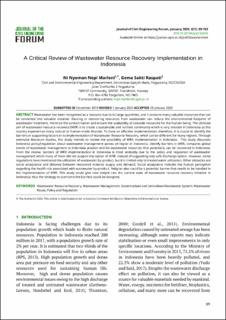| dc.contributor.author | Marleni, N.N.N. | |
| dc.contributor.author | Raspati, Gema Sakti | |
| dc.date.accessioned | 2022-09-21T08:01:08Z | |
| dc.date.available | 2022-09-21T08:01:08Z | |
| dc.date.created | 2022-09-19T12:28:42Z | |
| dc.date.issued | 2020 | |
| dc.identifier.citation | Journal of the Civil Engineering Forum. 2020, 6 (1), 89-102. | en_US |
| dc.identifier.issn | 2549-5925 | |
| dc.identifier.uri | https://hdl.handle.net/11250/3020085 | |
| dc.description.abstract | Wastewater has been recognized as a resource due to its large quantities, and it contains many valuable resources that can be converted into valuable material. Reusing or recovering resources from wastewater can reduce the environmental footprint of wastewater treatment, minimize the contamination and ensure the availability of valuable resources for the human being. The ultimate aim of wastewater resource recovery (WRR) is to create a sustainable and resilient community which is very relevant in Indonesia as this country experiences many natural or human-made disaster. To have an effective implementation, therefore, it is crucial to identify the barriers or supporting factors in its implementation of Wastewater Resource Recovery, which can be different for many regions. Through extensive literature studies, this study intends to review the possibility of WRR implementation in Indonesia. This study discusses Indonesia policy/regulation about wastewater management across all-region in Indonesia, identify barriers in WRR, compares global trends of wastewater management to Indonesia practice and list wastewater resources that potentially can be recovered in Indonesia. From the review, barriers of WRR implementation in Indonesia is most probably due to the policy and regulation of wastewater management which many of them did not support the option of WRR, instead of suggesting only safe discharge option. However, some regulations have mentioned the utilization of wastewater by-product, but it is limited only to treated water utilization. Other obstacles are social acceptance and distance between recovered material supply and demand. Social acceptance includes the human perception regarding the health risk associated with wastewater by-product. Religion also could be a potential barrier that needs to be handled in the implementation of WRR. This study could give new insight into the current state of wastewater resource recovery initiative in Indonesia; thus the strategy to overcome the barriers could be designed. | en_US |
| dc.language.iso | eng | en_US |
| dc.rights | CC BY SA 4.0 | * |
| dc.rights.uri | https://creativecommons.org/licenses/by-sa/4.0/ | * |
| dc.subject | Wastewater Resource Recovery | en_US |
| dc.subject | Wastewater Management | en_US |
| dc.subject | Decentralised and Centralised Wastewater System | en_US |
| dc.subject | Wastewater Reuse | en_US |
| dc.subject | Policy and Regulation | en_US |
| dc.title | A Critical Review of Wastewater Resource Recovery Implementation in Indonesia | en_US |
| dc.title.alternative | A Critical Review of Wastewater Resource Recovery Implementation in Indonesia | en_US |
| dc.type | Journal article | en_US |
| dc.description.version | publishedVersion | en_US |
| dc.rights.holder | © 2020 The authors | en_US |
| dc.subject.nsi | VDP::Teknologi: 500 | en_US |
| dc.source.pagenumber | 89-102 | en_US |
| dc.source.volume | 6 | en_US |
| dc.source.journal | Journal of the Civil Engineering Forum | en_US |
| dc.source.issue | 1 | en_US |
| dc.identifier.doi | 10.22146/jcef.52755 | |
| dc.identifier.cristin | 2053065 | |
| cristin.ispublished | true | |
| cristin.fulltext | original | |

